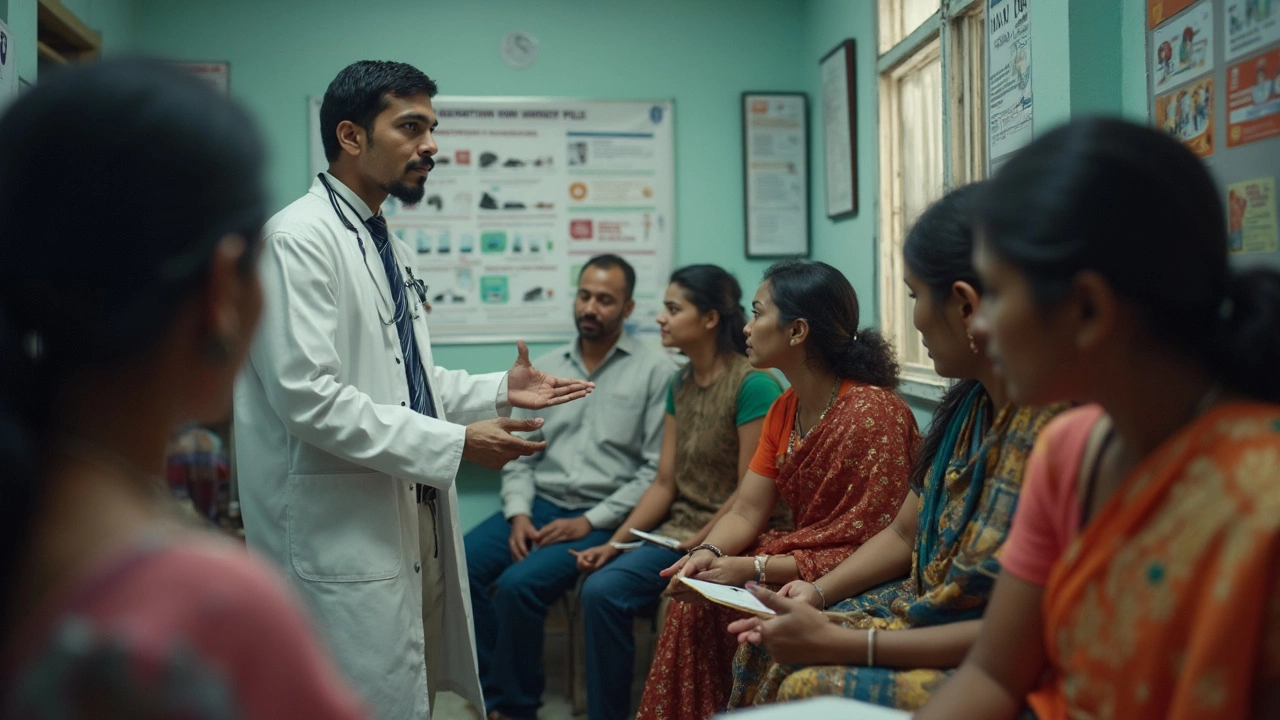- Home
- Weight Loss
- What is the #1 Weight Loss Pill? Honest Answers for Real Results

What is the #1 Weight Loss Pill? Honest Answers for Real Results
If you’ve ever typed 'best weight loss pill' into your search bar, you’re not alone. Maybe you heard about friends dropping pounds fast on Ozempic or saw flashy ads for 'miracle' pills on Instagram. Everyone wants an easy fix, but here’s the real question—does a true #1 weight loss pill even exist, or is it all hype?
Let’s cut through the noise. Most quick-fix pills you find online can’t back up their claims. The real heavy-hitters—the ones doctors at weight loss clinics actually prescribe—work in your brain or gut. Think GLP-1 drugs (like semaglutide, sold as Ozempic and Wegovy) or tried-and-true options like phentermine. These aren’t just random supplements; they have real science behind them, and they get handed out with close medical supervision, not just because you want a beach bod.
- Why Everyone Wants a Magic Pill
- Prescription Pills Doctors Actually Trust
- The Truth About Over-the-Counter Options
- How GLP-1 Medications Like Ozempic Changed the Game
- Risks Nobody Talks About
- Tips from Real Clinics: What Works Best
Why Everyone Wants a Magic Pill
Here’s the hard truth: losing weight isn’t fun, fast, or easy. Most folks aren’t overeating out of choice—they’re battling cravings, stress, jobs with zero time to cook, or just straight-up genetics. So when someone hears about a pill that might help, it’s like a lifeline. In the past ten years, the number of people struggling with their weight shot up worldwide. According to the World Health Organization, over 1 billion adults are overweight, and more than 650 million are dealing with obesity.
The pull toward a 'magic' solution just makes sense. For tons of folks, sticking to strict diets or gym routines isn’t possible, or they’ve tried and failed more times than they can count. Enter the idea of a weight loss pill—something that could give results without flipping your life upside down. No endless salads, no dragging yourself out of bed for 5 a.m. workouts.
- Social media throws before-and-after photos at you all day.
- Ads for 'natural' pills or 'doctor-approved' supplements show up everywhere.
- Quick fixes sound way more appealing than old-school hard work.
Certain prescription pills have gotten more attention lately, especially GLP-1 meds. Friends talk about them at dinner, celebrities mention them in interviews, and clinics promote them online. It all adds to the hype and makes people believe a pill can finally unlock the results they want.
| Reason | Why It Matters |
|---|---|
| Lack of time | Busy lives leave no room for hours at the gym or meal planning. |
| Past diet failures | Repeated setbacks can drain willpower and confidence. |
| Medical barriers | Some conditions make traditional weight loss much harder. |
| Social pressure | Constant images of ‘ideal’ bodies make quick fixes tempting. |
Wanting a simple fix isn’t just laziness—it’s a reaction to real challenges. That’s why clinics are seeing more people walk in and ask straight up, 'What’s the best weight loss pill out there?' The search for something that actually works is real—and growing fast.
Prescription Pills Doctors Actually Trust
If you ask any honest weight loss doctor what pills get real, measurable results for patients, you’ll hear a few names over and over. These aren’t miracle cures, but they stand out because there’s solid science to back them up. And yeah, you can’t just grab them off a shelf—they need a doctor’s okay, usually after a full check-up.
The first group that always gets mentioned are the GLP-1 medications: semaglutide (Ozempic, Wegovy) and liraglutide (Saxenda). These prescription drugs started as diabetes treatments but led to impressive weight loss in studies—sometimes 10-15% of body weight over a year. They help you feel full sooner, so you end up eating less without feeling like you’re starving. The FDA stamped its approval for people with obesity or weight-linked health risks, but the cost can sting if insurance won’t help. Side effects? Mostly upset stomach, but doctors monitor patients closely.
Phentermine has been in the game since the 1950s. It’s still popular today, especially in weight loss clinics where short-term appetite control matters. It works by kicking up certain brain chemicals so you eat less, but it’s only safe for a few months at a stretch, and folks with heart or anxiety issues should be careful.
Another prescription that’s legit is orlistat (Alli for the store version, Xenical for prescription). Orlistat blocks your gut from soaking up some of the fat you eat. It sounds perfect, but it means, well, hitting the bathroom a lot more if your diet’s greasy.
- weight loss pill — GLP-1 drugs like semaglutide and liraglutide are the current gold standard for big results.
- Phentermine can deliver fast, noticeable changes, but it’s for short-term use only.
- Orlistat helps if you’re willing to adjust what you eat to avoid side effects.
Docs choose based on your health, goals, and possible side effects. Forget skipping their advice—these meds are strongest (and safest) with medical oversight. No shame in asking for help either; loads of people need more than just willpower for this fight.
The Truth About Over-the-Counter Options
Walk down any pharmacy aisle or scroll through online shops, and you’ll see a crazy number of weight loss pills that don’t need a prescription. They promise fast results, usually plastered with big claims like “melt fat instantly” or “boost your metabolism overnight.” But here’s the thing: most of these are just expensive placebos or, at best, give tiny benefits you could barely notice. Few actually help with real, long-term weight loss—and some can even mess with your health if you’re not careful.
The main types of over-the-counter pills are fat blockers, appetite suppressants, and caffeine-heavy boosters. Most use things like green tea extract, garcinia cambogia, raspberry ketones, or fiber. Yeah, some ingredients might help a little—caffeine, for example, can raise your heart rate and give you a slight energy bump, but burning lots of extra calories from a pill? You won’t find real proof of that.
Check out this table of common over-the-counter weight loss pills and what studies actually say:
| Product | Main Ingredient | What Studies Say |
|---|---|---|
| Alli (Orlistat) | Orlistat 60mg | Blocks some fat absorption; can help lose 5-7 lbs over six months with diet changes, but may cause stomach issues |
| Hydroxycut | Caffeine, Plant Extracts | Short-term weight loss (about 1-2 lbs); possible jitters and heart palpitations |
| Garcinia Cambogia | Hydroxycitric Acid | Mixed results; some studies show less than 2 lbs lost over 3 months vs. placebo |
| Green Tea Extract | Catechins, Caffeine | Small effect (maybe 1-3 lbs after months); may cause liver issues at high doses |
Notice something? Almost every 'success' comes with either minor results or annoying side effects. And none of these match what prescription pills can do. The only over-the-counter option with real science (and FDA backing) is Alli, but even then, you have to stick closely to a low-fat diet or risk unpleasant bathroom surprises.
If you’re thinking about popping a pill you saw online, slow down. Look for brands that actually list their ingredients and avoid anything that looks too good to be true. And don’t expect miracles—most of these aren’t a substitute for patience and a good eating plan.
One last thing: if you’re after a weight loss pill that gives bigger, more reliable results, your best shot is still with a prescription that a doctor can tailor to your health—rather than rolling the dice on some random supplement.

How GLP-1 Medications Like Ozempic Changed the Game
If you’ve been watching weight loss news, you’ve probably heard of Ozempic and its cousins—Wegovy, Mounjaro, and Zepbound. These are GLP-1 medications, and they’ve upended the whole idea of a weight loss pill because they actually make a big difference for many people. Unlike other weight loss meds, these aren’t just short-term fixes or empty promises.
GLP-1 drugs (short for “glucagon-like peptide-1” receptor agonists) work by mimicking a hormone your body makes after eating. This hormone does two big things: it tells your brain you’re full, and it slows down how fast food leaves your stomach. So, you want less food, you feel full longer, and that’s a recipe for real weight loss—without feeling constantly hungry.
Let’s talk numbers. In a massive 2022 study published in the New England Journal of Medicine, people using semaglutide injections lost an average of 15% of their body weight over about a year. That blows most older prescription meds out of the water, which usually get you about 5–10% weight loss (if you’re lucky).
| Medication | Average Weight Loss (%) | How Taken |
|---|---|---|
| Semaglutide (Ozempic/Wegovy) | 13-15% | Injection (weekly) |
| Liraglutide (Saxenda) | 8-10% | Injection (daily) |
| Phentermine | 5-7% | Pill (daily) |
The fact that these numbers come from clinical trials—not some sketchy internet forum—matters. Doctors at legit weight loss clinics are prescribing GLP-1 meds for a reason.
But there’s a catch. You need a prescription, insurance doesn’t always pay for them, and they aren’t for everyone (people with certain medical issues can’t take them). Also, they’re usually given as a weekly shot, not a pill, though new pill versions are now in testing.
If you’re thinking about GLP-1 meds, here’s what to keep in mind:
- You’ll need a real consultation—not just a quick phone call or online quiz.
- Side effects can include nausea, diarrhea, and sometimes headaches, especially during the first weeks.
- Once you stop, weight can creep back unless you change your eating habits, too.
Long story short: GLP-1 medications like Ozempic have changed the world of medical weight loss, but they work best as part of a doctor-led plan—not a solo shortcut.
Risks Nobody Talks About
People want fast results, but chasing after the so-called weight loss pill comes with serious things people usually ignore. Let’s break them down without sugarcoating anything.
Prescription meds like Ozempic, Wegovy, and phentermine change how your body works. Most side effects are mild, but some are real deal-breakers. For example, semaglutide drugs can mess with your gut—think nausea, vomiting, diarrhea. And if you already have pancreas or thyroid problems? You could be looking at bigger risks, not just a queasy stomach.
Then you have phentermine, which can ramp up your heart rate. That’s fine if you’re healthy, but anyone with heart issues, high blood pressure, or anxiety disorders should be extra careful. Not every doctor prescribes it, and it’s never meant for long-term use. Slide into the black market or take more than you should, and you could wreck your sleep, your mood, and your blood pressure all at once.
Over-the-counter weight loss pills are another story. Most aren’t even tested for safety, and a lot are stuffed with stimulants or unlisted chemicals. The FDA pulled more than 100 weight loss supplements off the market in the last decade for hiding dangerous drugs like sibutramine or amphetamines. That’s scary, especially when the packaging looks totally legit.
For a better picture, check out some common side effects and severity levels reported by actual users:
| Pill Type | Common Side Effects | Serious Risks |
|---|---|---|
| Ozempic/Wegovy (Semaglutide) | Nausea, diarrhea, constipation | Pancreatitis, thyroid tumors (rare), gallbladder issues |
| Phentermine | Dry mouth, insomnia, increased heart rate | High blood pressure, addiction, heart arrhythmia |
| OTC Supplements | Jitters, upset stomach | Liver damage, hidden stimulants, heart problems |
So what’s the takeaway? Don’t pop anything just because an influencer says it works. Even if it’s doctor-prescribed, make sure it’s the right fit for you, not just the popular option of the year. Always ask real questions at your clinic and demand straight answers about side effects, especially if you have any preexisting conditions. Bodies aren’t one-size-fits-all.
Tips from Real Clinics: What Works Best
Let’s be real: weight loss clinics have seen every trend, fad, and quick-fix scheme out there. But when you walk through the clinic doors, you get advice that actually works. What do top clinics say when people ask for the #1 weight loss pill?
First, clinics never push one-size-fits-all solutions. Providers look at your health history, lifestyle, and even your lab numbers before handing out any prescription. Sure, GLP-1 meds like Wegovy get a lot of attention, but they aren’t always the obvious starting point. Here’s what most clinics actually suggest:
- Initial assessment matters: Expect a real medical check, not just a quick weight on the scale. Bloodwork, blood pressure, and screening for things like diabetes rule out health risks and pick the right med.
- GLP-1s (Ozempic, Wegovy): If you meet the criteria (BMI over 30, or 27+ with a related condition) and insurance approves, these meds often come first. Users typically see 12–15% body weight loss after several months, but they do come with side effects.
- Phentermine and similar: Phentermine is still popular for short-term use, especially if you need a jump start. Most clinics will limit it to 12 weeks because of side effect risks.
- Combos or alternatives: Sometimes you’ll hear about meds like Contrave (bupropion/naltrexone) or Qsymia (phentermine/topiramate). They’re usually options if you have specific health backgrounds or need a longer-term plan.
- Coaching and support: No matter what pill you get, clinics always push lifestyle changes. That means diet tweaks, fitness plans, real-life accountability, and sometimes even therapy help.
Check the numbers—here’s how the main prescription options stack up.
| Prescription | Average Weight Loss (6-12 months) | Common Side Effects | Typical Who-It's-For |
|---|---|---|---|
| GLP-1 (Ozempic, Wegovy) | 12-15% total body weight | Nausea, stomach issues, sometimes fatigue | BMI >30 or >27 with health issues |
| Phentermine | 5-10% total body weight | Dry mouth, elevated heart rate, insomnia | Short-term boost, adults under 65 |
| Contrave | 7-9% total body weight | Nausea, headache, increased blood pressure | Those with food cravings or depression |
| Qsymia | 8-10% total body weight | Tingling, insomnia, constipation | Longer-term, high BMI adults |
One tip you’ll hear from every clinic: Don’t expect miracles without putting in some work. Weight loss pills are tools—not magic. The best results come when you mix the right prescription with lifestyle changes, regular check-ins, and honest tracking. Always ask your clinic to help map out a plan you can actually stick with, and don’t shy away from talking side effects early on. Results are real, but there’s no dumb questions in the clinic—use your time to get answers so you can stay healthy for good.

Arnav Singh
I am a health expert with a focus on medicine-related topics in India. My work involves researching and writing articles that aim to inform and educate readers about health and wellness practices. I enjoy exploring the intersections of traditional and modern medicine and how they impact healthcare in the Indian context. Writing for various health magazines and platforms allows me to share my insights with a wider audience.
About
Medical Resource Center India is a comprehensive online platform dedicated to providing reliable health information and medical resources in India. Explore a wide range of articles, tips, and advice on medicine, healthcare services, and wellness. Stay informed about the latest developments in Indian medicine and access valuable insights into maintaining a healthy lifestyle. Discover expert guidance and health solutions tailored for every Indian citizen. Your go-to destination for authoritative medical knowledge in India.






